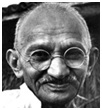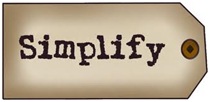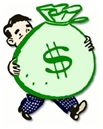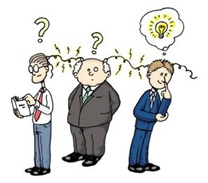|
 |
|
 |
|
|
||
Henry David Thoreau - Philosophy, Success and Happiness
Henry David Thoreau (1817-62)
American philosopher(pictured right), poet and influential supporter of:
His most famous book is... Walden (1854), a book that described his life (1845-7) in a log cabin he built near Walden Pond, Massachusetts, on land owned by his friend and teacher, Ralph Waldo Emerson (pictured right). They both believed in transcendentalism that values nature and the spirit of the individual. Who did he influence? His essay on non-violent resistance, Civil Disobedience (1849), greatly influenced: Mahatma ( Mohandas) Gandhi, the Indian leader (pictured right). Martin Luther King, the American civil rights
leader (pictured right below).
His tips on success and happiness
1. Simplify your life
2. Enjoy yourself a) love life Live it to the full.
b) use your time well Give more time to yourself (for thinking and relaxation) and to other people. It is better to be “poor in money but rich in sunny hours and summer days”, Thoreau said. c) don’t be a slave to money Use it to be happier.
d) exercise Exercise is a great way to relax and soothe your troubled mind. That’s why Thoreau always went for a walk after reading bad news in a newspaper! 3. Prioritize and change yourself Concentrate on what’s important like family and friends, not on frivolous inventions (“pretty toys” he called them). You have a responsibility to change and improve yourself, particularly in your spiritual life. Wisdom and peace of mind are much more important than fame and fortune.
4. Be free and creative
a) continuously learn (about yourself and the world around you).
b) do your own thing Do something creative, worthwhile and enjoyable without other people telling you what to do. So Thoreau moved to his log cabin in the woods “to live deliberately”, he said.
c) try something new Once you’ve done one thing, do something else. So Thoreau didn’t stay too long in his father’s pencil making business.
d) minimize government interference “Government is best which governs not at all”, he said.
5. Protect the environment He loved nature and believed it should be protected from commercial exploitation. (pictured right is the Rocky Mountains in America). “What is the use of a house if you haven’t got a tolerable planet to put it on?”, he asked.
6. Be optimistic Overcome your loneliness, despair, fear and anxiety with courage and hope for the future. But unfortunately most people have “lives of quiet desperation”, he said.
7. “Civil disobedience” (fight for right) Disobey a government whose actions are unjust and wrong. So in protest against slavery, he refused to pay his poll tax and spent a night in prison in 1846. “The only obligation which I have a right to assume is to do at any time what I think right”, he wrote.
Key quote on happiness I went to the woods to live deliberately...I wanted to live deep and suck out all the marrow of life
Key quote on innovation Our inventions are wont to be pretty toys, which distract our attention from serious things
Key quote on ethics The only obligation which I have a right to assume is to do at any time what I think right.
Key quote on peace of mind Our life is frittered away by detail...Simplify, simplify.
Key quote on society The mass of men lead lives of quiet desperation.
Key quote on fear and anxiety Nothing is so much to be feared as fear.
Key quote on politics and government Government is best which governs not at all.
Key quote on money A man is rich in proportion to the number of things which he can afford to let alone.
Key quotes on time management To affect the quality of the day that is the highest of arts. If a man does not keep pace with his companions, perhaps it is because he hears a different drummer.
Key quote on learning and wisdom Rather than love, than money, than fame, give me truth.
Key quote on interviewing and selection Do not hire a man who does your work for money but him who does it for love of it.
Key quote on change Things do not change; we change. |
|
|
||
|
|
||
| Copyright © wisdomtowin.com 2025 All Rights Reserved | ||
|















